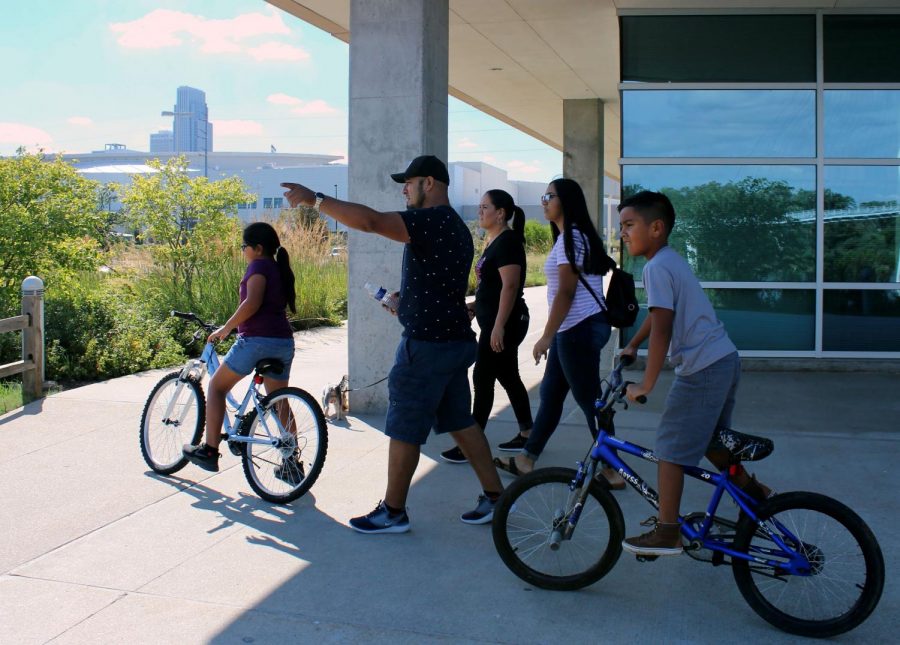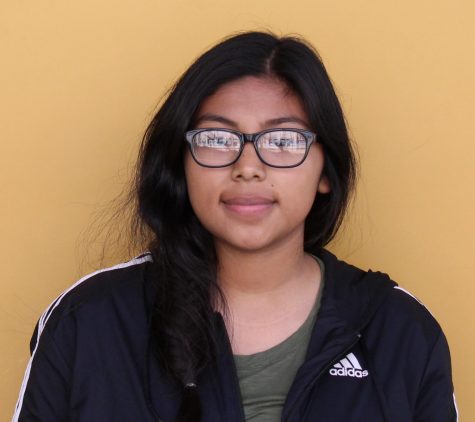Fuertes remains fuerte*
Fuertes works through struggles of having immigrant parents *fuerte=strong
Kasandra Fuertes and her family walk downtown near the Bob Kerrey Pedestrian Bridge on Sept. 9, 2018, spending quality time together. Her father, Jose Fuertes, pointed at the water that flooded the river banks. Photo by Joseline Albeño
October 24, 2018
Red, white, blue, and tears. Those are the things that filled her eyes. Fear and the sudden realization that her father could be deported at any moment hit her all at once.
Kasandra Fuertes, sophomore at Omaha North sat with her siblings in the back seat of their car while her father was driving, and her mother was in the passenger seat.
She was going home after saying her final goodbyes to her uncle who had passed away that week. While the feeling of loss lingered in her body, another wave of heartache and dread would soon hit.
Darkness slowly started to creep out and fill the skies, when suddenly the sirens and lights from a police car went off, signaling for her father to stop.
For most, being stopped by a police officer is not a big deal, but for an undocumented immigrant this could mean being pulled apart from their family or leaving their life behind forever.
The thought of her father being taken from her filled her mind with anxiety. Tears rushed down her face as the officer questioned him.
Since there was no officer who could speak Spanish, her older sister, Karen Fuertes, translated.
After being questioned, her father was let go, as long as someone with a driver’s license came to pick them up. A few moments later, a family member was there to take them home.
This situation could have ended much worse for Fuertes, and her family.
“I live in fear, [of my parents being deported] because, what would we do [without them]? I would be heartbroken. All of their hard work to get [to America] and all of the hard work they have done here to keep us good will be gone. We have already created so much here, I feel like it would have been for nothing. . . It can literally happen any day, but I hope I never ever see my parents go through that,” said Fuertes.
According to the Current Population Survey (CPS) conducted in 2017, immigrants and their U.S.-born children number approximately 86.4 million people, which is 27 percent of the overall U.S population. Fuertes is just another number whose voice goes unheard.
Fuertes has struggled growing up with undocumented parent because they could not help her in the ways most American parents would help their children. Growing up, her parents weren’t and still aren’t be able to help her with her school work. They weren’t able to attend most of her school events, and they weren’t able to communicate well with her teachers throughout the years.
Fuertes’ father, Jose feels “incompetent” and “frustrated” when he is not able to help his children.
Fuertes had to grow up faster than most kids, like many children who have undocumented parents do. She began to translate for her parents at a young age, helping them with medical calls, bills, and other important things that had to be translated.
“I’ve never been embarrassed to translate [for my parents] because I know I would never want to be in the place they are now because I know how hard it is for them,” said Fuertes.
In November 2011, the Applied Research Center (ACR) published a report stating there were more than 5,000 children of undocumented immigrants in the foster care system. They were placed in foster care because their parents were deported, and they had nowhere to go.
Most of these children are forced to live from house to house until they turn 18. In some cases, the parents’ custody rights expire, and the children are put up for adoption. If the child has siblings they will often be split up into different homes, causing them to never reunite with their families again.
According to the advocacy group First Focus, the amount of children being put into the foster care system because their parents were deported is causing many problems. Such as lack of support for children, broken homes, and costing taxpayers’ money.
Fuertes’ parents decided getting their children’s double nationality would be beneficial if they were ever in a difficult situation and had to bring their children along to the country they were born in.
A dual nationality signifies a person is a citizen of two countries. This means if Fuertes ever had to leave with her parents she could pursue her education and get a job in that country. This would make it easier for her and her family.
“We don’t have a plan set, but we do have family who have their citizenships and they could possibly help us in case of something bad happening, but for [my kids’] well being, it would be better to leave them here,” said Jose.
Jose and Fuertes’ mother, Ivonne, are aware of the risks they take every day by going outside. They have been keeping up with the recent ICE raids that have been happening in Omaha, NE work places. This worries them to the point where they don’t want to leave their children alone for the fear of not returning.
“I think it’s an everyday struggle being an immigrant. Everyday you’re risking something, like just getting in the car to drive [my kids] to school is a risk… I’m afraid to go to work… One leaves, but they don’t know if they will come back,” said Jose.
Fuertes, like her parents, is full of anguish over the thought of one day not being able to be with her parents. Her mother though, was in the process of receiving her citizenship before Trump was elected President and everything came to a halt. Ivonne has invested thousands of dollars and many years of her life to finally being able to
travel, get a license, and get a better job.
“I get really scared because so many years that I’ve been waiting [to get my citizenship], and I’m almost at the end of receiving my citizenship. But with this President, it’s hard to think about him taking everything that I’ve accomplished so far away,” said Ivonne.
Although having undocumented parents can get difficult for Fuertes, she does not hold any resentment towards her parents. She is proud and thankful for her them, she admires them for putting their lives on hold to give her and siblings a better chance at the future.
“We’re at the point where we don’t care if we don’t get our citizenships, as long as they let us be here with our kids, so we can see every one of them graduate from high school and college,” said Jose. Ivonne agrees.



